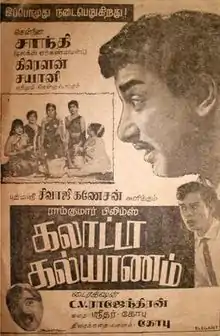Galatta Kalyanam
Galatta Kalyanam (transl. Riotous Marriage) is a 1968 Indian Tamil-language romantic comedy film directed by C. V. Rajendran and written by Gopu. The film stars Sivaji Ganesan and Jayalalithaa. It is based on Gopu's play of the same name. The film was later remade in Malayalam as Snehikkan Samayamilla and in Kannada as Aliya Devaru.[1]
| Galatta Kalyanam | |
|---|---|
 Poster | |
| Directed by | C. V. Rajendran |
| Produced by | Sivaji Ganesan |
| Screenplay by | Gopu |
| Story by | Sridhar Gopu |
| Starring | Sivaji Ganesan Jayalalithaa |
| Music by | M. S. Viswanathan |
| Cinematography | P. N. Sundaram |
| Edited by | N. M. Shankar |
Production company | Ramkumar Films |
Release date |
|
Running time | 148 mins |
| Country | India |
| Language | Tamil |
Plot
Madan (Sivaji Ganesan) and Lalitha (Jayalalithaa) are in love with each other. She is the second daughter of a businessman, Dharmalingam (Thangavelu). While seeking her hand in marriage, Dharmalingam lays down a condition that all his daughters' weddings are to be held simultaneously, thereby entrusting Madan with the unenviable task of finding suitable grooms for his other daughters. Madan seeks the help of his friend, Chandran (Nagesh) in his mission. Madan, however, soon realises that he has a Herculean task ahead of him – the eldest daughter Rathna (Manorama) is averse to marriage. The others have their own tastes and preferences. After encountering a lot of difficulties, they manage to find grooms for all of them. However, on the wedding eve, one of the grooms goes missing. After tracing the gang, Madan fights them to rescue the groom and finally all pairs get married.
Cast
- Actors
- Sivaji Ganesan as Madhan
- A. V. M. Rajan as Mohan
- Nagesh as Chandran
- Cho as Vittal
- K. A. Thangavelu as Dharmalingam
- V. S. Raghavan as Masilamani
- Mali as Gangster
- V. Gopalakrishnan as Gopi (a) Gopalakrishnan
- Actresses
- Jayalalithaa as Lalitha
- Jyothi Lakshmi as Kanchana
- Manorama as Rathna
- Kumari Sachu as Kantha
- Rajeswari as Sarasa
- Sundari Bai as Devi
- Seethalakshmi as Lakshmi
- Deva Manohari as Jaya
Production
Galatta Kalyanam was the adaptation of a stage play written by Gopu, which was staged in a star night organised for donations during the Chinese Aggression. Gopu completed the script within two days. After seeing the positive response the play has received, Sivaji expressed interest in adapting the play into a feature film. This was the first film which had Gopu working outside the banner of Chitralaya and the film was directed by Sridhar's cousin C. V. Rajendran.[2]
The song sequence "Engal Kalyanam", which featured all the lead pairs dancing together was shot at Anna Tower. Since everyone was busy, Rajendran had to rely on "used cuts, zooms and whizz-pans to circumvent the challenge".[3] In order to portray Sivaji as "stylish and youthful", he created a shot of Sivaji walking from the manager's room to his seat, which would create a huge response among the audience.[3]
Soundtrack
The music was composed by M. S. Viswanathan, and the lyrics were written by Vaali.[4] The song "Nalla Idam" contains the lines "Nalla Idam, Nee Vandha Idam" (Good place, the place you have come), which writer R. Kannan interpreted as meaning Jayalalithaa had moved on from acting exclusively with M. G. Ramachandran.[5]
| No. | Song | Singers | Lyrics | Length |
|---|---|---|---|---|
| 1 | "Appappa Naan" | T. M. Soundararajan | Vaali | 03:41 |
| 2 | "Engal Kalyanam" | T. M. Soundararajan, P. B. Sreenivas, P. Susheela, L. R. Eswari, C. S. Ganesh | 05:07 | |
| 3 | "Mella Varum Kaatru" | T. M. Soundararajan, P. Susheela | 03:39 | |
| 4 | "Nalla Idam" | T. M. Soundararajan, P. Susheela | 04:31 | |
| 5 | "Uravinil" | C. S. Ganesh, L. R. Eswari | 03:16 |
Reception
Malathi Rangarajan of The Hindu wrote "Together with Nagesh, Sivaji Ganesan made watching Galatta Kalyanam a memorable experience".[6] Anupama Subramanian of Deccan Chronicle praised Jayalalitha's performance stating that "It was Galatta Kalyanam [..] which brought out her flair for comedy".[7]
References
- "Vetern Director C.V.Rajendran Passed away". Cine Info TV. 2 April 2018. Retrieved 22 November 2018.
- Rangarajan, Malathi (10 July 2009). "Looking back with a smile". The Hindu. Retrieved 12 September 2015.
- Rangarajan, Malathi (8 September 2016). "In a flashback mode". The Hindu. ISSN 0971-751X. Retrieved 22 November 2018.
- "Galatta Kalyanam (1968)". Music India Online. Archived from the original on 15 August 2014. Retrieved 16 June 2018.
- Kannan, R. (2017). MGR: A Life. India: Penguin Random House. p. 154.
- Rangarajan, Malathi (25 July 2003). "`Comedian' par excellence". The Hindu. Retrieved 12 September 2015.
- Subramanian, Anupama (25 February 2013). "Jaya's phenomenal celluloid presence". Deccan Chronicle. Archived from the original on 19 June 2015. Retrieved 12 September 2015.
